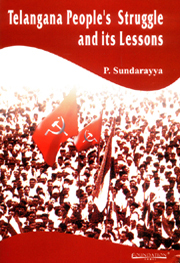Book contents
- Frontmatter
- Contents
- Preface
- Introduction
- PART I
- 1 Hyderabad State—its Socio-Political Background
- 2 The Peasant Upsurge and Communist Party
- 3 Armed Resistance Movement Against Nizam and Razakars
- 4 Telangana People's Armed Liberation Struggle Against Nizam – its Achievements
- 5 The Communist Movement in Andlira: Terror Regime—1948–1951
- PART II
- PART III
4 - Telangana People's Armed Liberation Struggle Against Nizam – its Achievements
from PART I
Published online by Cambridge University Press: 05 November 2011
- Frontmatter
- Contents
- Preface
- Introduction
- PART I
- 1 Hyderabad State—its Socio-Political Background
- 2 The Peasant Upsurge and Communist Party
- 3 Armed Resistance Movement Against Nizam and Razakars
- 4 Telangana People's Armed Liberation Struggle Against Nizam – its Achievements
- 5 The Communist Movement in Andlira: Terror Regime—1948–1951
- PART II
- PART III
Summary
From the narrative so far, we see how the people of Telangana, suffering from age-old, dark, feudal oppression, from forced labour and illegal exactions, from a cruel and hated feudal rule, their language and culture suppressed, groaning under a cruel, corrupt and autocratic rule, groped their way slowly towards a new life. They started out for some elementary relief in their miserable life; no vetti, no illegal exactions, no land evictions, no torturing and dishonouring; for elementary civil liberties; for education and culture and for responsible self-government. It developed under the leadership of the Communist Party and the Andhra Mahasabha into a powerful armed people's struggle for land and liberation, against feudal exploitation and against the hated Nizam's rule. It spread to about 3,000 villages, to nearly one-third of the Telangana area where gram raj (village panch–people's self-government) fighting committees were established. The Nizam's officials, the hated landlords, had to quit the villages, leaving the panch committees to carry on people's administration. Not only vetti, illegal exactions, land evictions, usurious loans, torturing and dishonouring by corrupt officials and village oppressors were put an end to, waste lands and surplus lands of the landlords, to the extent of a million acres, along with the necessary cattle and agricultural implements were distributed to the rural poor; fair wages for agricultural labourers were enforced and grain produced by this toil was distributed along them. People used to say that for the first time in their lives, they could have two full meals a day.
- Type
- Chapter
- Information
- Telengana People's Struggle and it's Lessons , pp. 83 - 101Publisher: Foundation BooksPrint publication year: 2006
- 1
- Cited by



